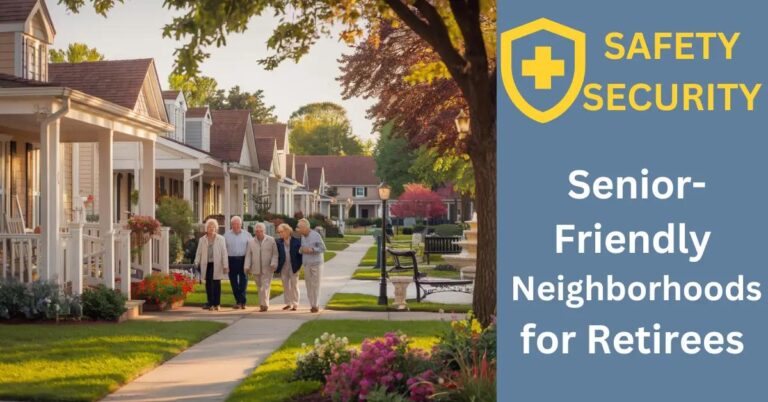TL;DR:
- Urban Retirement Pros: Easy access to shops, hospitals, entertainment, public transport, and social events.
- Urban Retirement Cons: High costs, noise, crowds, pollution.
- Rural Retirement Pros: Peace, spacious, cheaper, nature access, tight-knit communities.
- Rural Retirement Cons: Limited services, healthcare access, utilities, and English speakers.
- Safety: Urban areas have better emergency services but higher crime; rural areas are quieter but with slower emergency responses.
- Cost: Urban living is more expensive; rural areas have hidden costs like transportation.
- Healthcare: Urban areas offer better services and quicker emergency responses.
- Housing Options: Urban offers diverse amenities; rural offers tranquility and space.
- Cultural Amenities: Urban centers have more activities; rural areas have deep cultural experiences.
- Transport: Urban areas have accessible public transit; rural areas may lack connectivity.
- Recreational Activities: Urban areas provide social clubs, while rural areas focus on nature.
Thinking about retiring abroad? It's a big decision! One choice looms large: urban living or rural charm? Each comes with unique perks and challenges, especially when safety, cost, and community play vital roles. Will city life offer you vibrant cultural experiences, or will the countryside's peace be your haven? Let's explore these diverse options to discover which best fits your retirement dream. Dive in to learn more!
Safe Urban vs. Rural Retirement Living Abroad: What Are the Pros and Cons?
Retiring abroad is like choosing a new adventure. What are the pros and cons of retiring abroad? Both urban and rural settings offer unique experiences.
Benefits of Retiring in Urban Areas
In cities, everything you need is closer. Shops, hospitals, and entertainment are easy to find. Public transportation makes getting around simple. Urban retirement living abroad offers diverse social activities and events. Many cities have active expat groups. These groups help you make new friends fast.
Drawbacks of Urban Retirement Living
City life can be expensive. The cost of living abroad in urban areas often includes high rent. The hustle and bustle might not suit everyone. Noise and crowds in cities can sometimes be overwhelming. Polluted air and traffic are also common issues.
Advantages of Rural Retirement Living
The countryside brings peace and quiet. You often get more space for less money. Many retirees enjoy a slower pace of life in rural retirement living abroad. Nature is right at your doorstep, great for those who love the outdoors. Rural areas often foster tight-knit communities.
Disadvantages of Rural Retirement Settings
However, rural areas might lack services. Healthcare facilities might be farther away. You might need a car to get around. Internet access and other utilities could be limited. Finding English speakers might also be harder in very remote settings.
Comparative Analysis of Quality of Life
The quality of life for retirees depends on individual needs. Urban areas cater to social lifestyles and access to amenities. Rural areas are best for those seeking peace and a close community. Each option has its share of trade-offs. Balancing what you need with what is available is key, as discussed here. Find what suits your dream retirement life, and embrace it!
How Does Safety Compare in Urban and Rural Retirement Areas?
When deciding between urban and rural retirement as an expat, safety is key. Where is the safest place to retire as an expat? Safety really depends on personal needs and preferences, rather than a set location. In urban areas, you often find more police presence and community security systems. This can make these areas feel safer for many retirees.
Crime statistics reveal contrasts in safety for each setting. Urban areas may have higher crime rates overall, but these often come with access to swift emergency services. On the contrary, rural retirement areas might feel quieter and less chaotic. Yet, they may lack quick responses to crimes or emergencies.
What about safety in rural settings? Rural zones can face unique challenges like fewer police patrols and slower emergency help. However, the close-knit nature of rural communities often fosters a sense of safety through neighborly watchfulness.
Effective safety measures are crucial for expats, no matter the setting. In cities, many rely on technologies like smart doorbells and neighborhood apps. Rural areas might focus more on building trust with local residents and being aware of local safety practices.
Community security systems such as neighborhood watch programs make a big difference. Public safety resources, like police or fire stations, often differ in location types. Urban retirees might find nearby stations and faster services. For rural residents, local volunteer networks might fill the gap.
Both environments have their pros and cons concerning safety. The decision rests on balancing personal peace of mind with practical details like crime rates and emergency response times. Exploring local crime data and community feedback can help you make an informed choice for safe retirement living.
What Are the Cost of Living Differences Between Urban and Rural Retirements?
The cost of living greatly affects where retirees choose to settle. Those interested in cost-effective retirement destinations should first compare urban and rural settings. One key difference is daily expenses. Urban areas often have higher food and entertainment costs. In contrast, rural settings can offer cheaper groceries and fewer paid activities.
Housing costs also vary significantly between the two. Urban areas typically have higher property prices, whether you buy or rent. However, cities do offer more housing options with diverse prices. Rural living might offer more affordable homes, but renting could be less flexible than in cities. Keep in mind other factors like hidden costs in rural living. These are often due to transportation and utilities. Living further from shops and services can mean higher travel costs. Also, rural homes often rely on self-supplied utilities like well water or propane.
Some countries are known for their budget-friendly retirement locations. For example, Portugal and Spain attract many European retirees. They balance quality of life with affordability. Southeast Asia also offers appealing choices for global retirees. Here, the cost of living is generally lower. In finding the safest and cheapest country to retire in, look at a mix of housing, health care, and daily costs.
Europe offers options like Bulgaria for an economical retirement. Bulgaria is known for affordable living costs with European quality. Evaluating value for money is essential when picking retirement locations abroad. Consider daily needs and long-term costs. More vibrant urban areas might ask for larger budgets for daily expenses and housing. Conversely, rural regions might need more spending on mobility and utilities.
Urban and rural areas each have their unique costs. Safety often aligns with the nation's general security. Before choosing, balance safety, personal needs, and budget constraints. Visit potential locations to understand expenses better.
How Accessible Are Healthcare Facilities for Retirees Abroad?
When considering retirement abroad, healthcare access is key. Cities usually have more high-quality medical centers. If you retire in a city, you'll likely find hospitals and clinics nearby. These places often have specialists and modern equipment. Urban living often ensures quicker help in emergencies.
However, rural living might not offer the same level of care. Smaller towns may have fewer doctors and hospitals. You might need to travel long distances for serious care. While rural areas can be peaceful, the lack of immediate care is a concern.
Health insurance is another thing to think about. You might need international health insurance in both city and rural settings. Insurance helps cover costs that local healthcare does not. Some countries require proof of insurance for expats before you can even move there.
One of the vital questions is, "Which country is best for retired life?" The answer depends on what you need from healthcare. Some countries excel with urban technology and medical staff. Examples include countries like Spain and Portugal, known for excellent medical care in cities.
Emergency services need to be close if you have health problems. Urban areas tend to have faster emergency responses. Consider the distance to the nearest emergency room wherever you decide to live.
Elder care is also important. In cities, you might find specialized elder care services. These services support daily activities and provide needed assistance. Rural areas could lack such services, posing a challenge for those needing extra care.
Choosing between urban and rural depends on your health needs. Ensure you pick where healthcare best fits your lifestyle.
What Housing Options Are Available for Retirees Abroad?
When planning retirement abroad, housing becomes a top concern. One question often asked is: Would you choose to live in the city or in a rural area? Precision dictates the answer: It depends on lifestyle preferences and needs.
In urban areas, there are many housing choices. You might find apartments, condos, or even high-rise buildings filled with various amenities. These options often provide easy access to public transport, shopping, and healthcare. Urban living can also mean more hustle and bustle, with plenty of social activities and events.
In contrast, rural housing offers a quieter lifestyle. Here, retirees can choose from cottages, farmhouses, or country homes. Such places often come with larger plots of land, offering peace and a closer connection to nature. The trade-off might be fewer services nearby, but many value the tranquility.
Understanding the real estate market in your chosen destination is vital. Popular retirement spots often have a competitive housing market. Researching local prices and trends will help you make an informed decision. Keep in mind the real estate market abroad can vary significantly depending on the country and region.
The choice between homeownership and renting is also crucial. Owning a home can offer stability and investment potential, while renting offers flexibility. Renting might also be ideal for those who wish to try out different regions before settling down. It's key to weigh the advantages and drawbacks of each option.
For those seeking more comfort, luxury retirement options abound. These can include resort-style communities or upscale senior living facilities. Such options might offer pools, gyms, and organized activities.
Selecting the right housing abroad depends on many factors. Think about your lifestyle, budget, and long-term goals. It's a significant decision that can shape your retirement experience. For more details on housing, explore further insights and expert tips online.
How Do Cultural Amenities Differ Between Urban and Rural Areas?
When I consider retirement abroad, cultural amenities play a big role. In urban areas, you find a wide range of museums, theaters, and art galleries. Cities buzz with events, offering a lively dose of excitement and learning. These urban centers attract many seniors who enjoy a rich cultural life.
Rural areas offer something unique, too. Deep traditions and authentic cultural experiences are available in smaller towns. Here, you might attend local festivals or witness time-honored crafts. These are less polished, but often more heartfelt, than city experiences. I love the idea of participating in a harvest festival or a town dance.
Both settings present chances for cultural exchanges. In cities, joining local clubs or classes is easy. This helps in integrating with local communities. The language could be a hurdle, but it’s also a chance to learn something new. Immersing myself in a language-rich environment has big benefits. It keeps the mind sharp and helps break down barriers.
In rural settings, the pace is slower, allowing deeper connections. You might find yourself a part of traditional ceremonies or local storytelling events. These areas often cherish history and can give a newcomer a warm welcome.
Community involvement opportunities are present in both settings, yet they vary. Urban areas have more diverse events, but rural areas might offer more intimate gatherings. Engaging in these activities can lead to a strong sense of belonging. Participating in community events with locals advances integration.
When picking a place for retirement, consider what cultural fit feels right for you. People have diverse interests, so the best cultural setting depends on what warms your heart. Invest time to explore both urban and rural opportunities. Retirement is a personal chapter, filled with choices about how and where to connect.
What Transportation and Connectivity Options Are Available?
In cities, public transportation shines. Buses, trains, and taxis swarm the streets. Retirees can navigate easily, with frequent stops nearby. This network makes it simple to visit friends, go shopping, or see a doctor. In urban locations, public transit becomes a lifeline for many seniors.
Rural areas, however, tell a different tale. Buses may arrive only once a day, or not at all. Personal transport becomes key. Driving rules and insurance can add costs. The cars you need may not suit every retiree's budget.
Internet access defines much of modern life. Cities allow retirees to enjoy high-speed internet at cafes and homes. Streaming, emailing, and video calls become seamless. This level of connectivity keeps people informed and socially active.
Meanwhile, rural settings may pose challenges. Internet speeds tend to drag, with limits on streaming or video chats. Depending on the locale, some areas may lack broadband altogether. The promise of high-speed connectivity lures some to urban living.
Smartphones connect the world in your hand. In cities, mobile signals keep retirees updated anywhere, anytime. Be it banking, staying healthy, or just having fun, the options appear endless.
Rural locales might falter here, too. Signals can drop when you most need them. While more towers pop up, some valleys or secluded spots stay dark. This can leave retirees feeling isolated and out of reach.
Considering transportation costs, urban options often win for economy. Passes for local transport may cost less than owning a car. But, these savings can shrink if private transport is vital in sprawling cities.
Comparing both, urban areas seem clearer favorites for those valuing connectivity and convenience. Yet, the peaceful charm and landscapes of rural living hold their magic. Balancing these factors can guide your choice on where to enjoy retirement abroad. Want more on internet challenges in these areas? Explore Internet Access Challenges here.
What Recreational Activities and Social Supports Exist for Retirees?
Retirement abroad is full of fun and friendships. Many cities have parks, gyms, and community centers. These places offer retirees easy access to pools, yoga, and art classes. Urban areas also have theaters and social clubs, which help people stay active and meet neighbors.
In the countryside, retirees enjoy nature and peace. Hiking, fishing, and bird-watching are popular in these open spaces. Local farms may offer classes on gardening or animal care. These activities allow retirees to enjoy calm days and connect with others who share their love of the outdoors.
Expat groups play a big part in helping retirees abroad. These groups organize regular meetups, which help newcomers find friends fast. Social clubs for expats may host language classes, cooking lessons, or book clubs. Expats build connections and feel at home through these friendly gatherings.
Volunteering is another option for retirees who want more. Many places have programs where expats can lend a hand. Volunteer programs might include teaching English or helping at local shelters. The work brings joy while making a positive change.
Part-time work is also available in some retirement spots. Teaching, writing, or consulting are common roles for skilled retirees. This work adds structure to daily life and offers a way to earn extra money.
Hobbies are easier to pursue in many foreign regions. Whether it's making art, playing sports, or learning an instrument, options abound. Groups and classes provide instruction, motivation, and a chance to meet others with shared interests.
Choosing between urban and rural retirement affects available activities. Both options offer varied ways to create a full and happy life. Prioritizing activities explains where retirees might feel most engaged and supported. This means deciding carefully can improve the retirement experience, ensuring it is as fulfilling as possible.
Conclusion
Choosing between urban or rural retirement living abroad is complicated. Urban settings offer convenience, diverse culture, and better healthcare. Yet, they come with higher costs and less tranquility. Rural life offers peace, lower expenses, and nature but lacks amenities.
Safety varies; urban areas have better security but higher crime rates. Rural spots can be peaceful yet less secure. Costs also differ, with urban living pricey but convenient.
Healthcare access is critical: urban areas excel, while rural ones may struggle. Housing options range from city apartments to countryside cottages.
Cultural and recreational opportunities abound in cities; rural options promote tranquility but less variety. Evaluate your needs and desires to make the best retirement choice.







